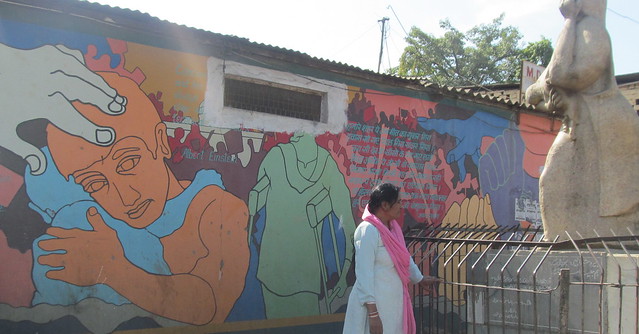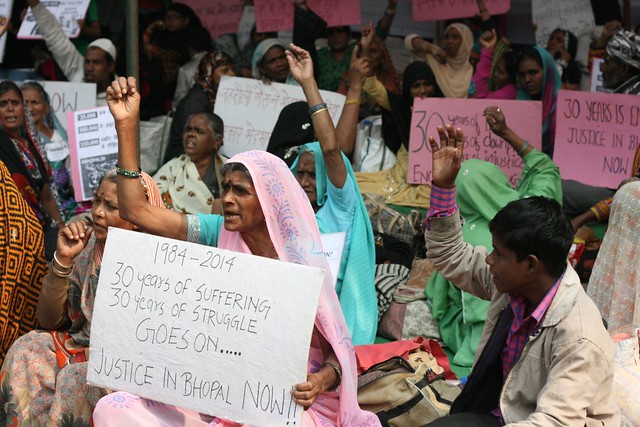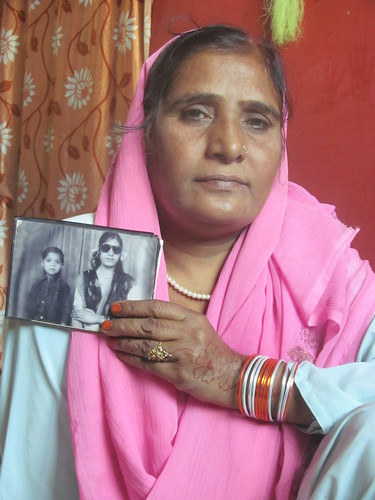It has been labeled as the world’s worst industrial disaster. Thirty years ago, on December 2-3 night, a cloud of deadly methyl-isocyanate enveloped the sleeping innocents in the neighbourhood of the Union Carbide plant that killed at least 3000 immediately and left thousands others suffering a lingering death. Even after three decades of struggle, justice remains a distant cry.
In this fourth of the six part series, TwoCircles.net finds out how this gas justice movement also shaped a kind of feminist movement where the victims came out from pardah and started street protests.
(Read Part I here: “It was difficult for mothers to save their children, for children to save their aged parents”
(Read Part II here: Widows of tragedy an icon of government’s apathy
(Read Part III here: Abdul Jabbar: an underrated champion

By Mohd Ismail Khan, TwoCircles.net,
Bhopal: Call it a syndrome of a city that has seen reign of female rulers for a century or just the fate of a tragedy-battered settlement, which has produced widows and orphans and with them a loud cry for justice.
The 30 years of struggle by and of the gas victims has unfolded more on the streets of the city than in the court settlements. An interesting aspect of this struggle is that women have not just led the movement but also form a large chunk of protesters in every agitation called in the name of Bhopal Gas tragedy.
These women activists leading the protests for Bhopal gas victims shatter every stereotypical image of a conventional feminist. Many female activists in the struggle not just fight against the Carbide and its stooges but also the sting of society.
A case in point is Rasheeda Bi. Presenting clichés doesn’t hinder her from the work she is involved in, arranging and tying a bundle of white papers. On her right, doing the same work is Champa Devi Shukla.
Rasheeda Bi lost almost half of her family, seven members, in the gas leak that winter night in 1984 while Champa Devi Shukla lost almost every male member of her family. Her only surviving son committed suicide unable to bear the pain of his punctured lungs.
They were not alone when on the intervening night of December 2-3, 1984, a toxic gas leak from the Union Carbide Corporation’s pesticide plant in this Madhya Pradesh capital killed and affected thousands of people. Around 3,000 people were killed instantly – official figure contested by activists – and many others suffered a lingering death over the years. It left victims injured and maimed, with many suffering lung cancer, kidney and liver failure and eye disorders after coming into contact with toxic methyl isocyanate (MIC) gas.
But what separates the two – elderly women just like any other grandma in the neighbourhood – is their sheer grit against the powers that be. Exhausted with work, wearing printed faded sarees, both continue to work at the police stationary printing press for past 28 years to earn a living.
But the unassuming appearance has hidden behind them recipients of the international environmental prize, who have travelled to almost a dozen countries from Greece to Thailand to spread the message of environment conservation. “We have seen one catastrophe with our own eyes, our attempt is to enlighten the world not to let another happen,” says Shukla, whose international outlook belies her humble surrounding with stationary items scattered around.
Leaders in their own right, for both Rasheeda Bi and Champa Devi, their struggle started the night of gas leak but the time which tested their spirit began at the police printing press. Madhya Pradesh government had appointed 1,000 gas affected women to the printing press. But soon, the allotted jobs were cancelled just after three months of pay. Rasheeda and Champa organized fellow gas affected women workers and met the then district collector and even the chief minister. Their agitation resulted in regularization of their jobs, which led to the formation of the Bhopal Gas Peedit Mahila Stationary Karamachari Sangh.
After the infamous 1990 Union Carbide settlement, women stationary workers hit the street protest, for the first time taking out agitation outside printing press. Ever since, the duo says, stationary work women were always ahead in fight, just as they were in 2006 Padyatra from Bhopal to Delhi, which led the government to provide funds for safe drinking water or even the protest against Indian Oil and Dow chemical contract.

In 2004, they won the Goldman Environmental Prize in California which is awarded annually to grass root activists. Along with a golden circle trophy, they also received a cash prize of $1,50,000. Both could have kept that amount as their old age retirement guarantee but the grandmas with ideas of flame had some other plans.
They donated the whole amount, which at that time came to Rs 58 lakhs, to the new generation of Bhopal, the children born with deformities and disorders, some congenital. Aptly named the charity trust called ‘Chingaari’, which now caters to the needs of nearly 500 gas effected children from the next generation which government doesn’t recognize as affected.
Out of purdah she questions, “Rajivji, why did you give permission?”
In JP Nagar – the worst affected locality due to its proximity to the Carbide factory – Shamshad Appa is more popular than the local MLA. She struggles to make ends meet but doesn’t hesitate a bit from her activism. Even as her youngest daughter cribs with her about non-payment of school fees, she is busy over phone discussing plans for anniversary – of a different kind.
Shamshad Bi proudly remembers how she was the only woman in the crowd of thousands of men and also the only one who had dared to question the then Prime Minister Rajiv Gandhi when he visited JP Nagar.
“Rajivji, why did you give permission to such a poisonous factory in our locality? – I questioned him point blank,” Shamshad Bi recalls with a voice, which even strongest of the men would feel dwarfed with. “He (Gandhi) was speechless to find a woman questioning him. He just looked here and there, and went ahead without answering.”
It was Shamshad’s first encounter with any government figure. Shamshad, who lost her only son – a six-year-old – in the tragedy, became fiercer with every official who came between her rights or the rights of other victims.

Shamshad Bi showing the picture of good old days
Holding a photo frame from the happy days with young Shamshad in sunglasses stands besides her adorable son. Her activism started when the government closed the tailoring center for the gas victims. As one of the founding members of the Bhopal Gas Peedit Mahila Udyog Sangathan, she led a month long demonstration, which finally reopened the tailoring center.
Since three decades, she claims to have participated and led nearly 600 protests in an around Bhopal and Delhi. “Even all the men in the locality approach me and ask my help in dealing with government officials,” Shamshad says in a triumphant tone.
But where does a simple housewife get such confidence to involve into an activist from, especially in view of the fact that she used to live in complete purdah? “In my locality, everyone is uneducated. They use to find it difficult to get admission even in hospital. I fought with doctors to ensure their proper treatment, I struggled for their jobs. Locals started respecting me for my work and I continued with my activism,” Shamsad says.
All her activism wouldn’t have been possible had it not been her husband’s support, who “recognized the quality of leadership and confidence” in her and always applauded her efforts to achieve justice. Her husband passed away seven years ago fighting a prolonged lung disease.
But not every women activist is as fortunate as Shamshad to get their family support for social work. Hajra Bi breaks down remembering the day when her husband left her as he was against her going out and taking part in protests.
Hajra was left with three minor children and just a lot of Beedi paper trash for rolling-work that both husband and wife used to do together. She says it didn’t discourage her from taking up the issues of Gas Peedit (affected) and hitting the streets because “I knew I was on the right path and will one day make him proud.”
Like many other women her activism started for basic rights. “I wanted to enroll for tailoring center to get some support for my family. But the organizer won’t let me in. Someone told me that District Collector is the head. I directly went to his office and debated with him till he put a stamp on my application. The moment I got the stamp, I understood a common woman can also achieve something on her own.”
Hajra Bi has recently returned from Delhi as part of the International Campaign for Justice in Bhopal’s mass protest demonstration demanding enhancement of compensation. Where ever she moves, people young and old, both men and women surround her asking status of their cases or what politicians are saying.
When asked if she regrets joining activism at the cost of her domestic life, her tear soaked face suddenly gives an abundant smile. “Even my estranged husband used to call me when hospital staff didn’t treat him properly or some government official sat over his pension amount,” she says prompting rest of the women sitting beside her to burst into laughter. Hajra’s husband passed away four years ago but her endurance for justice continues.
And it is not just her struggle, her endurance which is tested at every step, every corner during this long journey. With ostentation of gender part of the protest, Rasheeda Bi, Champa Devi Shukla, Shamshad Appa and Hajra Bi – and many more – make a larger point. As Rasheeda Bi says: ‘Yeh Bhopal ki Gas Peedit Nari hai, Phul Nahi Chingaari hai’ (She is a gas affected woman of Bhopal, she is a sparkle of fire, not a flower). One day, these women will become a flame and will awaken the whole world.”
Related:
